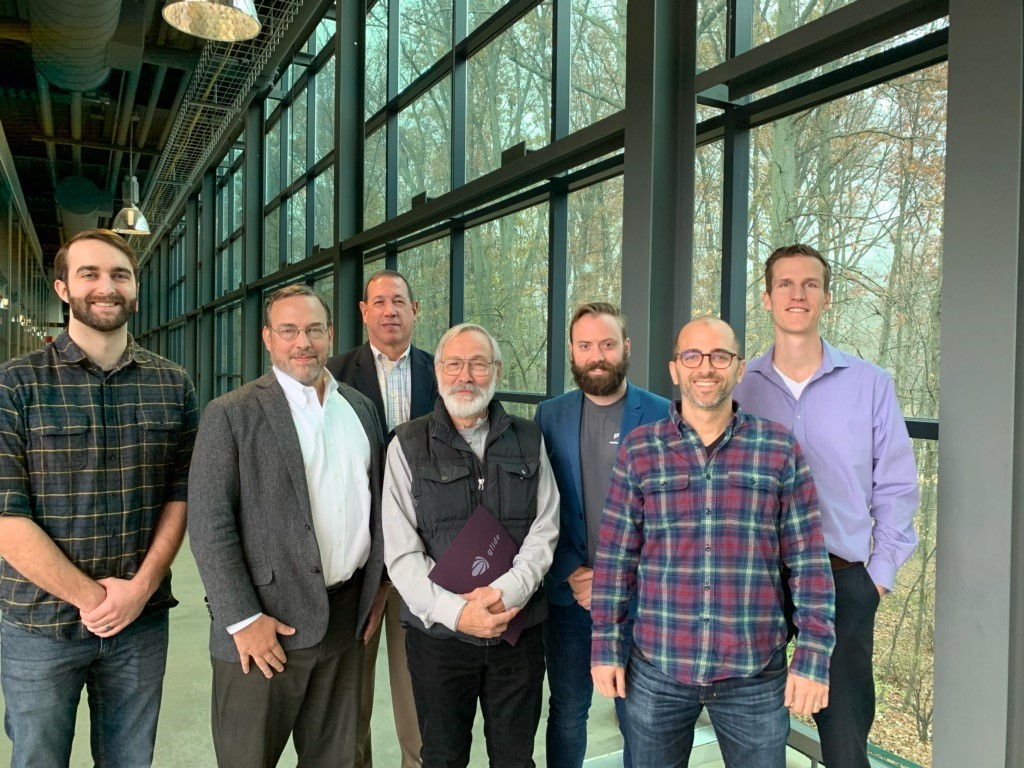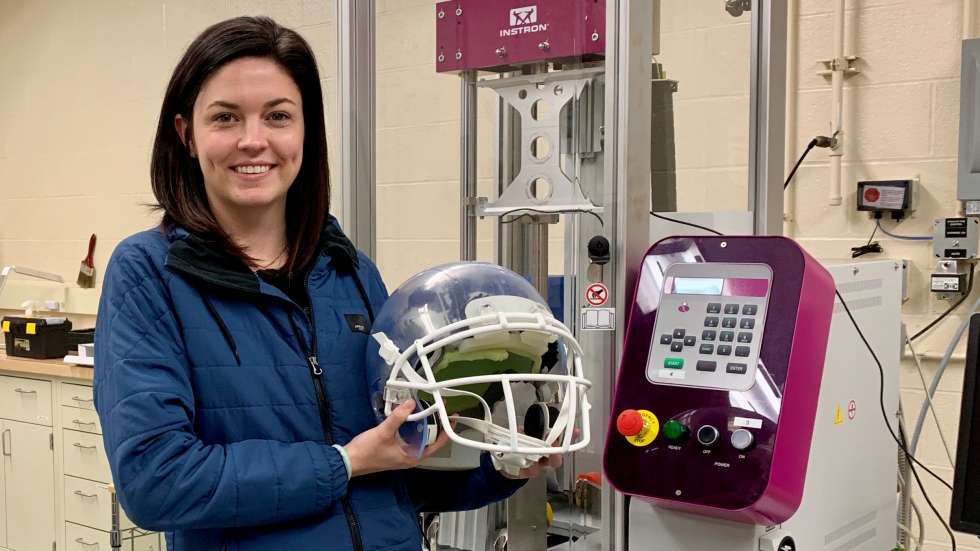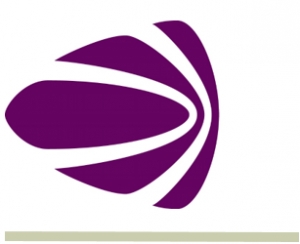Leigh Keeton
Innovation Fund Commits $275,000 to 5 Northeast Ohio Startup Companies

December 9, 2019 |Elyria, OH: Innovation Fund Northeast Ohio, the region’s most active pre-seed fund for technology-based startups, has awarded $275,000 to five startup companies. These companies are due to receive Innovation Fund awards ranging from $25,000 to $75,000, allowing them to carry out projects that will further their technologies.
“The quality of presentations from this group of entrepreneurs made the round of funding extremely competitive, which is a testament to how the region is rising the tide going forward,”-said Jim Walborn, Co-Director of GLIDE.
The following five companies received funding in the 49th cycle, which ended on September 15, 2019. They were chosen after a thorough three-month application and selection process:
Prophit.ai ($25,000 | Cleveland Heights) applies advanced machine learning technology to help prevent U.S. corporations from overpaying the $30B of sales tax that is paid in error each year. Currently, the only option is to have a team of external tax consultants spend months to recover this money through a reverse audit, but they charge up to 35% in contingency fees. With Prophit.ai’s subscription software, corporations can prevent these tax overpayments from happening in the first place and break the endless cycle of reverse audits.
According to CEO Austin Murray, what differentiates them from others on the market is that “Prophit.ai is the only company offering machine learning software that corrects tax over- and underpayments proactively.”
Strife AI ($25,000 | Olmsted Township) is developing a software platform to allow video game developers to leverage the latest machine learning (ML) techniques. With billions of dollars up for grabs, competition in the gaming industry is extremely fierce. Players have both limited time and money, so game development studios of all sizes are looking for cutting-edge gameplay to entice players to their games. ML is a promising area for unlocking new kinds of player experiences, but many small game development studios lack the expertise needed to add this technology to their games.
“Every existing game genre could use ML,” says founder Brendan Mulcahy. By creating an affordable and reusable software package, Strife AI can enable these companies to attract new players and sell more games.
RoadPrintz Inc. ($75,000 | Cleveland Heights) is bringing modern robotic technology to the dangerous and inefficient field of pavement marking, superseding the historical practice of hand stenciling symbols such as turn arrows, bike logos, etc. Founder Sam Bell is developing a special truck equipped with a robotic arm that won’t be scalded by using hot paint that dries in less than a minute. Instead of using stencils, it will use GPS measurements guided by a computer. Their system will dramatically increase safety and improve efficiency of road painting, offering greater precision, speed, and flexibility while reducing risk to operators, reducing traffic congestion, and supporting greater road safety through enhanced markings.
Using this modern technology, Bell figures he can restripe roads for less than a third of the going rate. “Our focus is on the robot intelligence that makes our system capable of outperforming humans in road painting,” he says.
Thrivable ($75,000 | Bedford) is a technology platform that helps health care organizations tap into a comprehensive patient database to do market research activities. Right now the market research process is slow, expensive, and frustrating for companies. Thrivable has created a solution that reduces the time it takes to get insights from months to hours.
“This company began as a labor of love. I met a woman who had been diagnosed with type 1 diabetes, and we wanted to connect and learn from others in our situation. So we built a website called Diabetes Daily to make it happen,” founder David Edelman says. “As our community grew, health care organizations began reaching out to better understand our community. They said that they were struggling to find the right patients to speak with about their products. We built Thrivable to address their needs.”
NelDerm ($75,000 |Strongsville) develops and sells hydrogel dressings for treating various types of wounds, securing IV lines, and collaborations with wearable medical technology companies. NelDerm’s hydrogel dressings provide a truly hypoallergenic alternative in would care, based upon careful research and development. They are an ideal solution for any patient with sensitive or fragile skin.
“We believe completely in the gentle effectiveness of our Hydrogel Dressings, and we know they fill a significant need in improving patient care,” says founder Kevin Nelson. “That’s why we founded NelDerm – to help patients and care providers.”
Since the Innovation Fund launched in 2007, it has committed more than $15 million to 274 Northeast Ohio startups.
For more information on these and all the Innovation Fund portfolio companies, visit innovationfundamerica.org/portfolio
About the Innovation Fund
The Innovation Fund, founded by the Lorain County Community College Foundation, is Northeast Ohio’s most active and successful early-stage fund. It awards technology-based startups up to $100,000 so they can validate their technologies and business concepts. The Innovation Fund averages six funding awards each quarter and fills the capital needs of businesses at the earliest stage of development, before they can attract angel and venture capital funding. Innovation Fund awards are made with funds from the Ohio Third Frontier, which have been combined with matching support and contributions from the Innovation Fund partners. These partners include the University of Akron, the University of Akron Research Foundation, Braintree Partners, Cleveland State University, the Great Lakes Innovation and Development Enterprise (GLIDE), the Lorain County Community College Foundation, Stark State College, the Youngstown Business Incubator, and Northeast Ohio Medical University.
Innovation Fund Awardee Hyr Medical Offers a Solution to Healthcare Staffing
Healthcare staffing has long been a big business — and a major spend category for hospitals and healthcare systems.
But are the established staffing models meeting the needs and expectations of healthcare delivery organizations and contingent healthcare professionals? And are there alternatives?
Spend Matters spoke with Manoj Jhaveri, the co-founder and CEO of Cleveland-based Hyr Medical, which aims to leverage lean processes and technology (including blockchain) to provide a lower friction, higher velocity alternative to traditional locum tenens staffing.
Spend Matters: So, in a nutshell, what is Hyr Medical? And why did you start the business?
Manoj Jhaveri: Hyr Medical offers a transparent, online staffing platform that enables physicians and hospitals to directly connect for freelance work. We also provide upfront transparency into rates and practice locations, and we are automating portions of the credentialing process, using blockchain.
Hyr Medical got started after I got to know my first co-founder, Dr. Faris El-Khider, in 2017. Faris had firsthand experience working as a freelance (“locum”) physician and explained that the experience was extremely painful, slow, paper-based and frankly stuck in the 1980s. There was also a lack of transparency. For example, key information like hourly rate and hospital name was not provided upfront, and staffing agencies sought to increase their 40-60% markup on the physician’s rate. We knew that this was a big, hairy, audacious problem (with a massive market size) worth solving, and so Hyr Medical was born! Hyr now includes three additional co-founders (CFO, COO, CSO), four key advisers, five doctors who are regional VP’s and four employees.
What exactly does Hyr Medical do? What are the target markets on the demand and supply sides?
Hyr Medical has developed a two-sided online marketplace that enables locum/freelance physicians — as well as certain advanced practice practitioners (APPs) — and hospital systems, standalone hospitals, urgent care clinics, private practices and medical groups to automatically match and connect with each other for freelance work. Today, most of our current jobs are in the Midwest and Southeast/South USA, and we are starting to expand more now into the East Coast and West Coast. We currently serve a range of different healthcare organizations that include Cleveland Clinic, Miami Jewish Health, Northstar Anesthesia, Rogers Behavioral Health and others.
It was always clear to us solving the staffing problem had to go beyond just enabling matches. It also had to solve the very painful credentialing issue, which is what we are doing. We have deployed Phase 1 of our credentialing solution, in which we utilize some automation and access to key data sources such as CAQH and NPDB. Our current solution is three times faster than the typical staffing agency timelines, which can exceed three months. But we are not stopping there. Our goal is to achieve an almost instantaneous credentialing time by applying lean processes with technology and APIs, and by leveraging blockchain.
Yes, something I found unique about Hyr Medical was what the company was doing with blockchain and credentialing. I know you are working with Axuall. Can you sum up what the relationship with Axuall and where that fits in your overall business model?
Solving the physician credentialing problem is inextricably linked to solving the overall healthcare staffing problem. Our strategic partnership with Axuall is critical to our business success. Axuall is rapidly building a blockchain-based, credentialing commerce network that includes holders, verifiers and subscribers.
That will significantly reduce the waste and redundancy in the current credentials supply chain, including medical professional credentialing. Why verify something like where a physician went to medical school over and over again; instead verify it once and protect it using blockchain technology. We are already engaged in Axuall pilots.
On the demand side, where you are working with healthcare systems, etc., what functions/roles are you finding the business development discussions are happening with? Procurement, HR, COO, line management?
We generally engage with the following roles in the organization for our early informational meetings and software demo: the CEO, Chief Medical Officer, CSO, COO, Chief Innovation Officer, CFO, Director of Physician Recruiting or the Director of the Medical Staff Office. The smaller the organization, the less time is generally spent with the C-Suite, as their time is more limited. Also, with large systems and groups, the CLO and Chief Procurement Officer (CPO) are generally involved, and we usually have to register as a preferred vendor.
What’s your view of the competition? I know there are other healthcare platform players out there, like Nomad Health. Apart from where you are going with blockchain credentialing, what are Hyr Medical’s other differentiators?
Our view is that the market for online healthcare staffing platforms is not a “winner take all” market. We believe that in the Physician/APP space, three to five platforms will ultimately dominate, and we will be one of them. Freelance staffing is a $15 billion market today and will more than double by 2025. Incumbent staffing firms will still remain, but more share will be gained by online platforms like Hyr Medical over time. Direct competitors like Nomad are actually a good thing for Hyr because they will raise the general awareness and adoption of using online platforms for staffing. This is still very new to medical practices today, but an increasing number are getting the advantages and benefits. The market for platforms like ours is definitely expanding.
We think we have a number of other differentiators other than what we are doing with credentialing. We are hyper-focused on physicians and APPs, not on other healthcare professions, such as nursing. We go beyond rate management and focus on getting high quality doctors at high velocity to reduce/eliminate revenue leakage and improve patient throughput. We also think, and hear from our users, that our platform user experience is best in class. Finally, another differentiator will be our quality scorecards, which enable physicians to earn and display “badges” and will also enable physicians to opt in and display ratings and comments from facilities where they have worked.
We’re nearing the end of 2019, what does the future of Hyr Medical look like going forward through 2020?
Based on the traction we’re getting now and what we have planned for 2020, we’re very optimistic. We will be launching our iOS and Android mobile apps which will enable push notifications and alerts, in Q1 2020. In addition, we’ll also be launching our Physician Quality Scorecard. Finally, our integration w/ Axaull will become deeper, and we will complete Phase 2 of our credentialing transformation roadmap by the end of 2020.

Strife AI
Strife AI is developing a software platform to allow video game developers to leverage the latest machine learning (ML) techniques in games.
Prophit.ai
Prophit.ai applies advanced machine learning technology to help prevent U.S. corporations from overpaying the $30B of sales tax that is paid in error each year. Currently, their only option is to have a team of external tax consultants spend months to recover this money through a reverse audit, but they charge up to 35% in contingency fees. With Prophit.ai’s subscription software, corporations can prevent these tax overpayments from happening in the first place and break the endless cycle of reverse audits.
Website: https://prophit.ai/
RoadPrintz
RoadPrintz brings advanced robotics to a dangerous, widespread, labor-intensive task: road painting. The RoadPrintz system will dramatically increase safety and improve efficiency of road painting, offering greater precision, speed, and flexibility while reducing risk to operators, reducing traffic congestion, and supporting greater road safety through enhanced markings.
Its patent pending technology builds on CWRU R&D in robotics and automation. The objective is to apply markings to surfaces as specified precisely in geospatial coordinates or to overpaint existing markings as desired. The heart of its technology is software, and RoadPrintz will operate as a software company. The startup's focus is on the robot intelligence that makes the system capable of outperforming humans in road painting.
Website: https://roadprintz.com/
Farm Fare Wants to Help the Environment with Small Farms

What if eating locally sourced food wasn't just a trend or a bonus, but a way of life? That's the vision for Farm Fare, a Cleveland startup that created a custom software to help small farms compete with large, industrialized competitors by sharing resources and providing logistics to help keep costs down. The platform creates networks of farms and food hubs to improve distribution, data and efficiency, helping local products stay in your area.
“At Farm Fare, we help small- and medium-sized family farms, usually between 15 and 50 acres, gain access to markets like hospitals, public schools and universities,” said co-founder and CEO Cullen Naumoff. “We help regional food hubs collaborate and provide farms with data that tells them exactly what to plant based on what those institutions want to purchase. In America, four percent of farms own 70 percent of the market, and there’s something wrong with that picture. We think the future is collaborative with small farms efficiently feeding their own communities.”
Farm Fare isn’t just about tasty food or market efficiencies – the startup also takes its environmental role seriously. Naumoff said the company is focused on the sustainable and environmentally friendly aspects of local food, which makes their mission more than just a business plan.
“The United Nations recently predicted that, globally, there are only 60 harvests left, which means we only have 60 more years to produce enough food to feed the world’s population in my lifetime,” said Naumoff. “We know that big, industrial agriculture won’t work. We’re facing this global urgency, and we can use the knowledge we have to better support our own communities. We can’t just help farms get bigger and bigger. Instead, we want to support the very communities that give us our fresh food. We have a better, more equitable future in mind.”
Farm Fare was founded by Naumoff, Laura Adiletta and Daniel Conway, who each brought a different perspective to the enterprise. Naumoff had worked at food hubs and had an agricultural background, Adiletta had been a chef and food critic, and Conway co-owns Great Lakes Brewing Company. By the time the trio was sharing their idea with farms and organizations, they were receiving overwhelmingly positive feedback. The response prompted Naumoff and Adiletta to quit their day jobs and go all-in on Farm Fare’s mission.
“At the food hub, I realized there had to be a better way to connect family farms to distributors and the end customer,” said Naumoff. “We knew that a new supply chain model could support the local food economy, and we knew technology could get us there. Institutions really want to purchase locally, but they’re very price- and volume-sensitive. So, we needed a way to achieve greater efficiency, and that’s exactly what our tool does.”
For Farm Fare, the future includes expanding beyond northeast Ohio to food hubs in New York and the east coast before eventually stretching across the country. The startup is well on its way toward that growth, and has forged connections with a combination of local entrepreneurial resources like JumpStart, Great Lakes Innovation and Development Enterprise, and BrainTree, and good relationships with local food organizations and distributors. Thanks in part to an award from the Innovation Fund Northeast Ohio, they have plans to continue to scale their concept.
“Those folks have been tremendously supportive of us and believe in us, and it makes all the difference when you’re trying to get something like Farm Fare off the ground,” said Naumoff. “When you’re exploring the entrepreneurial environment, it’s like opening one door and seeing 10,000 more possibilities. These resources have been such a help in navigating which doors to open. I think you have an edge when you say, ‘I’m from Cleveland. Let me tell you about what’s happening in Ohio.’ We’re not just another Silicon Valley or New York startup.”
iRxReminder wins AMIA 2019 PitchIT contest in Washington DC
iRxReminder, a Cleveland-based start-up, selected as the winner of the 3rd annual American Medical Informatics Association competition in Washington DC.
Cleveland, OH - The American Medical Informatics Association held its third annual competition to identify the best new solutions in healthcare that use information and informatics to improve patient care. The contest is run in partnership with MedStartr, a crowdfunding marketplace for healthcare company development, that seeks entrepreneurial organizations to invest in and accelerate. Start-ups from all over the country were asked to submit a project idea and were vetted by the MedStatr community that includes healthcare experts and iRxReminder was selected as a finalist.
Five teams took the stage on Sunday morning, November 18, at the AMIA annual conference in Washington DC to compete for $25,000 in grants and entry into the MedStartr Acceleration Program. Each team was given 6-minutes to present a complete overview of their company, the problem to be solved, explain their unique solution, and present the business case.
“I was stunned and thrilled when they announced our name,” said Anthony Sterns, CEO of iRxReminder who made the winning pitch. “The other teams are also doing great things with large data sets and have relationships with major clinical organizations.” However, the judges determined that iRxReminder has the strongest business case and that the other competing companies still left them guessing as to how their ideas could scale and grow.”
We worked closely with our lead mentor Cathy Lippert from the Burton D. Morgan Mentorship program, Russ Donda our mentor from the GLIDE Innovation Fund, and Jim Weisman, our mentor at BioEnterprise to build a strong business case to help mental health agencies support their patients and staff with our proprietary technology.
Mental health service agencies have a serious problem with over 25% of their client-patient population routinely in crisis. iRxReminder provides a smartphone app and a wirelessly connected smart pill dispenser to patients. When patients take their medication the confirmation of dispense is shared with their healthcare team. What makes iRxReminder unique is that the dispenser works with a dosing window. If the patient takes the medication on time on their own, in the first half of the dosing window, they get no alert. Only when they forget do they get an alert. As they get better at taking the medication on-time, they get fewer more meaningful alerts driving high adherence.
“We are training people to take their medications on-time without help,” said Dr. Sterns. “People want to feel in control, and with our method, they are not nagged by an alarmed box telling them what to do.”
The contest began with companies joining a special AMIA MedStartr Crowd Challenge and teams competed to be a finalist by how much the crowd and judges like, follow, try, partner, pilot, mentor, and invest in the ideas and companies. iRxReminder was actually the first alternate but was elevated to compete when another company could not make the trip to Washington. The other finalists included: IANN, Inference Analytics Neural Network of Chicago, IL, who came in second, Stocastic E-Triage of Baltimore, MD, who came in third. IrisOB Health, Inc. of Scarsdale NY, who won the People’s Choice award. MedAux of New York, NY, also competed.
Judges included:
Andrew Park, the Managing Director of Warburg Pincus
Charles Safran, Professor of Medicine at Harvard Medical School,
Craig Feied, MD former Chief Strategy Officer at Microsoft Health Solutions Group and Professor of Emergency Medicine in the Georgetown University School of Medicine.
Michael Kaufman Managing Partner of Knowledge Based Transaction Partners.
Steve Tolle, a Partner HLM Venture Partners
About iRx Reminder, LLC. iRxReminder is a Cleveland, Ohio-based medication management platform service provider focused on empowering patients and healthcare professionals to manage medication adherence. Our platform ensures that patients achieve high medication adherence, communicate timely with their care team, and improve healthcare outcomes. The iRxCapture app, available in the Apple App Store and Google Play store, is a customizable, bidirectional tool that empowers patients with a unique behavioral approach to compliant self-managed medication taking. The technology also provides effortless remote clinical monitoring that triggers timely and critical interventions by agency staff. The data from monitoring and intervention activities also provides reimbursable activities that help agencies increase their revenue up to 40-percent for their patients using the technology. The company has projects completed or in progress with such institutions as Harvard University, The University of Michigan Cancer Center, George Mason University, Case Western Reserve University, Kent State University, University of Wisconsin School of Medicine, and Summa Health System. The company plans to evolve with FDA clearance of the iLidRx, their wireless smart pill dispenser that verifies medication dispensing as a 510(k) Class II medical device. It is a complete patient-centered medication management and education system that addresses accountable care and population-health-management goals. For more information, go to www.irxreminder.com or contact Larry Tusick, Vice President of Business Development.
4 Innovation Fund Winners Chosen as the Best Tech Startups in Cleveland for 2020
The Tech Tribune recently released a list of the best tech startups in Cleveland for 2020. Out of the ten companies chosen, 4 of them were Innovation Fund NEO award winners. These companies are Heureka Software, BoxCast, iRx Reminder, and FarmFare.
Heureka Software: The Heureka Intelligence Platform gives you real-time access to unstructured data on network file systems, servers, VM’s, laptops and desktops in order to respond to eDiscovery requests, comply with GDPR & privacy regulations and to automate information governance policies.
BoxCast: BoxCast is a complete, easy-to-use live streaming solution for organizations. They believe that every event that is watched live should be streamed live.
iRx Reminder: iRx Reminder is a complete tech solution and system for patient activation, medication management & adherence with robust real-time reporting and data capture capability.
FarmFare: Farm Fare is a delivery service, hub management software suite, and mobile shopping app that curates and connects the local food supply chain from source to destination. Founded in Cleveland, Ohio, in April 2016, Farm Fare serves the B2B market, such as restaurants, schools, grocery stores, and food artisans, to distribute the freshest products found within 100 miles of the business. They believe that local food is better food – for people, planet, and profit.

Innovation Fund Awardee Hedgemon to Compete in NFL Helmet Challenge
The NFL kicked off its helmet challenge with a symposium in Youngstown Thursday.
The NFL Helmet Challenge is offering $3 million in grants and award money to the developer of a new, safer helmet that outperforms current helmets.
About 300 people from around the world, from helmet makers to innovators and experts, have gathered for a series of panels and presentations Thursday and Friday focused on helmet design and innovation, along with concussion prevention.
Emily Kennedy, co-founder and CEO of Cleveland-based Hedgemon, is among the innovators at the symposium vying for the top prize.
“There'll never be another opportunity to be in the same room as all these different sorts of people,” Kennedy said.
Hedgemon has developed a helmet liner inspired by hedgehog quills and Kennedy said the company is hoping to team up with a helmet manufacturer through the challenge to develop a full helmet prototype.
“We're hoping, over the course of these couple of days, we'll develop collaborations with people who can help us with development of the full system,” Kennedy said.
Helmet manufacturers Riddell, Xenith and Vicis were at the symposium.
Challenge participants must submit helmet prototypes for lab testing against impacts by May 2021.

Innovation Fund Graduate MedCity News Acquired By Breaking Media
Breaking Media, the owner of b-to-b sites like Fashionista, has acquired MedCity News as an attempt to branch into the health-care market.
MedCity News is the leading online news source for the business of innovation in healthcare. It offers insight into what’s next and what matters with a mix of breaking news and analysis on startups, and established industry leaders, personalities, policies and the most important deals.
MedCity News is a recipient of both the Innovation Fund A and B awards, having received $25,000 in June 2009 and $100,000 in March 2010.
MedCity CEO Chris Seper will join the company's board as the new vice president of healthcare. Along with the CEO, eight staff members from the Cleveland-based editorial will continue working for MedCity after the change of ownership.





